Outreach
Scientists at iMM work in areas important to human health, such as oncology, infectious diseases, neurodegenerative diseases, among many others and they are keen to understand the mechanisms that lead to these diseases, finding clues to better diagnosis and new treatments.
Since these themes are absolutely relevant to society it is of the outmost importance to make the research developed at iMM more perceptible and increase the involvement of people with science.
A structured program promoting a two-way communication between scientists and citizens is currently being developed and implemented at iMM.
Newsletter iMMagine
Click here to subscribe to the monthly iMM newsletter and stay up to date with all the news.
Previous issues:
- Issue #13 - October 23, 2023
- Issue #12 - September 25, 2023
- Issue #11 - July 31, 2023
- Issue #10 - June 26, 2023
- Issue #9 - May 29, 2023
- Issue #8 - April 24, 2023
- Issue #7 - March 27, 2023
- Issue #6 - February 27, 2023
- Issue #5 - January 30, 2023
- Issue #4 - December 26, 2022 (only available in Portuguese)
- Issue #3 - November 28, 2022 (only available in Portuguese)
- Issue #2 - October 31, 2022 (only available in Portuguese)
- Issue #1 - September 26, 2022 (only available in Portuguese)
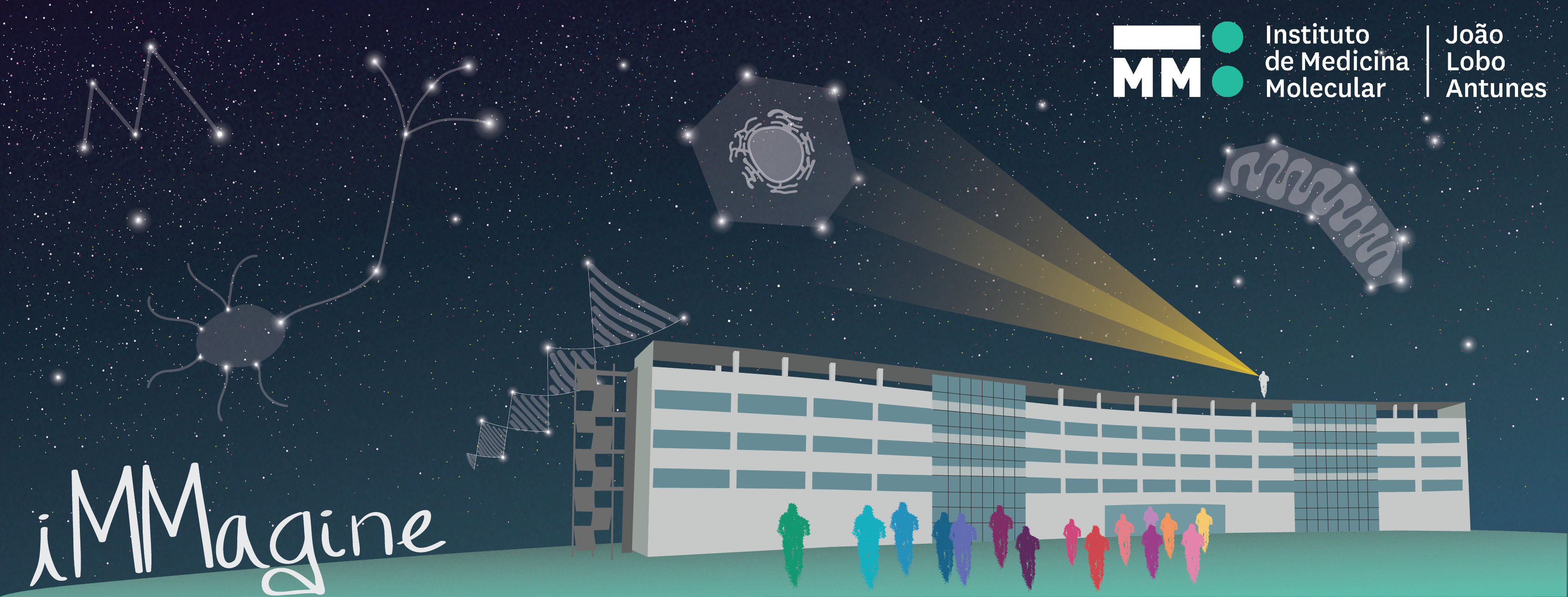
RAISE - Researchers in Action for Inclusion in Science and Education
RAISE – Researchers in Action for Inclusion in Science and Education – aims to reach members of society that continue to be left out or feel detached from science. It is built around a concept of co-creation that will blend Researchers at Schools activities with European Researchers’ Nights public events over the next two years.
Carried out in Portugal, RAISE will connect researchers with Portuguese citizens and/or residents, particularly children and their families coming from underserved and/or underprivileged backgrounds, making science feel more useful and relevant to all and, ultimately, contributing to a more inclusive and diverse landscape in science and education.
To actively and effectively promote diversity and inclusiveness in science, the main target audience of RAISE is children and adults from underserved and/or underprivileged communities, and the methodologies used to implement the European Researchers’ Night events and the Researchers at Schools programmes are culturally responsive and evidence-based.
Discover more about RAISE here.
"RAISE for Wellbeing. RAISE for Social Impact"
Neuropal | Online Game
Online game about safety and the nervous system
Neuropal aims to help recognise risky situations and adopt safe behaviours that may prevent serious injuries, while also exploring the anatomy of the nervous system and the important functions it performs.
The game takes us on an adventure with two friends, Neuropal and Neuro, vacationing on a tropical paradise where unexpected events force everyone to escape. Neuropal will have to move through different landscapes and challenges to leave the island safely. Every completed level can be replayed as many times as we want, to show off our new safety skills and improve our score. Neuropal also includes quizzes about safety and a glossary where we can explore more about the nervous system.
Neuropal came about within a research project about regeneration of spinal cord injuries, funded by “la Caixa” Foundation at Leonor Saúde Lab, in iMM. The wish was to go beyond the research work and communicate with the public, especially with young audiences, about how to prevent these injuries.
Know more here.
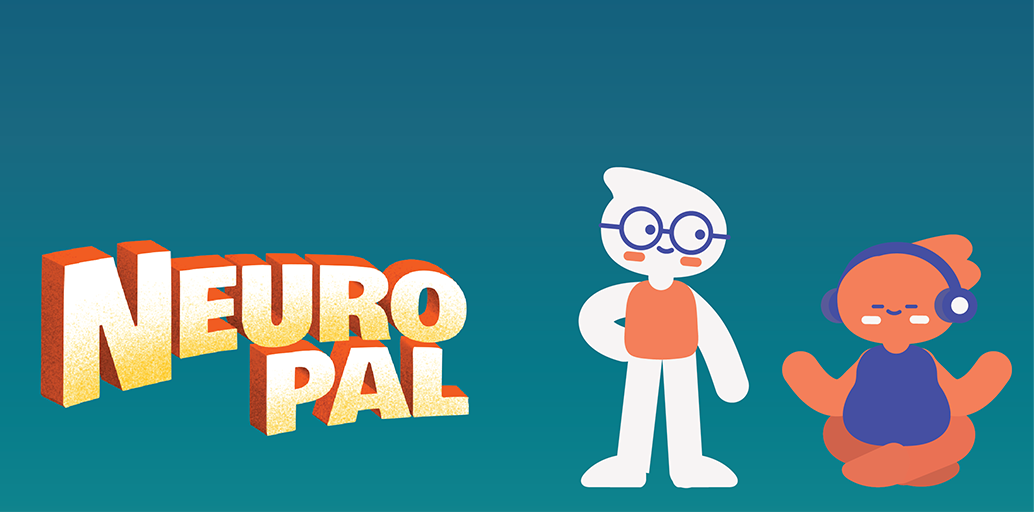
Horizontes iMM: Uma pergunta a três | 2019
A scientist, a medical doctor and a patient are brought together around one same question. This is the motto for the new cycle of public talks that will be based on four discoveries made by iMM scientists. These discoveries may strongly impact the future of human health and we want the society to know it and discuss them. This cycle of talks will have in 2019 four sessions. The first session will be held on February 20 at 18h00, at the João Lobo Antunes Grand Auditorium.
Why does cancer escape us? is the first question that will be discussed by Fernando Rosas (former deputy of the Bloco de Esquerda, the patient), Luís Costa (the doctor) and Bruno Silva -Santos (the Scientist) and will be moderated by Graça Franco (journalist and Director of Radio Renascença). Between February and October (dates below) in addition to cancer, the public will be able to learn more and discuss neuromuscular diseases, Parkinson's disease and spinal cord injuries.
We are interested in contributing actively to the public debate on the direction and purpose of biomedical research in Portugal and to a scientific dissemination of quality. The guest panel of these sessions brings physicians, scientists, politicians, journalists, important personalities from civil society and anonymous citizens to iMM, thus promoting a closer relationship between Science and Society. This initiative is made in partnership with Fundação Belmiro de Azevedo.
Know more about Horizontes iMM: Uma pergunta a três.
For more informations: Horizontes iMM
Why does cancer escape us?
February 20, 2019
Participants: Fernando Rosas, Luís Costa and Bruno Silva-Santos
Moderated by: Graça Franco
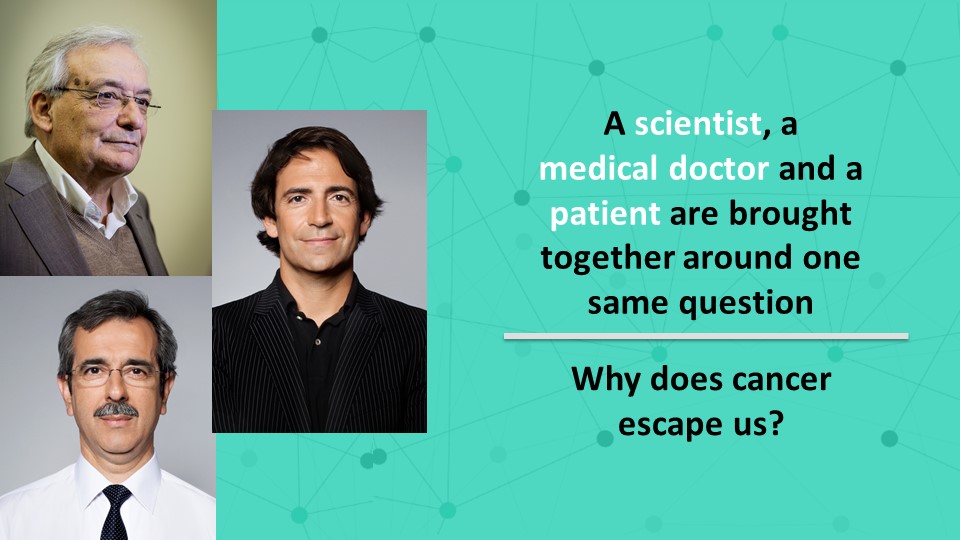
Why do muscles fail to obey?
March 20, 2019
Participants: Pedro Souto, Mamede de Carvalho and Edgar Gomes
Moderated by: Graça Franco

Why does the brain stop communicating with the body?
June 19, 2019
Participants: Paulo Teixeira Pinto, Joaquim Ferreira and Luísa Lopes
Moderated by: António Barreto
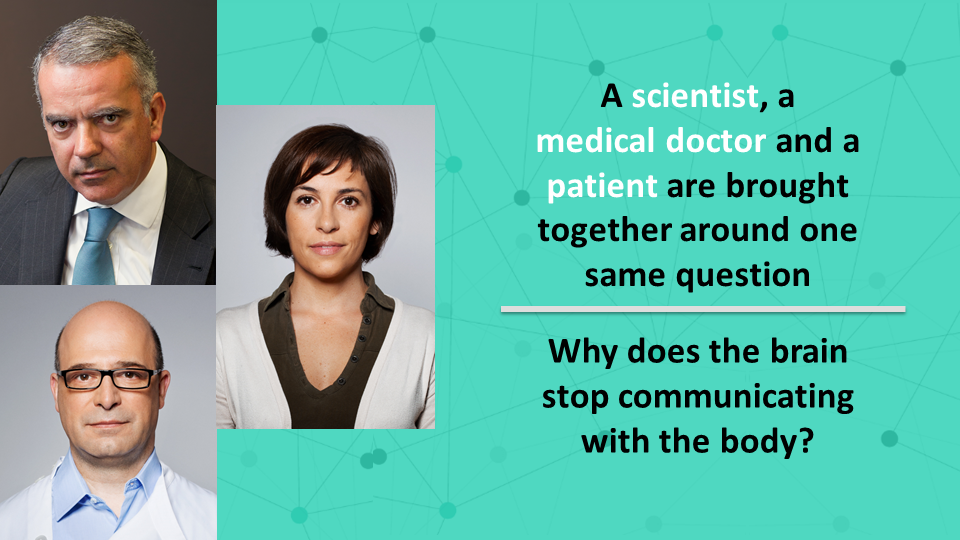
Why doesn't the spinal cord regernerate?
October 16, 2019
Participants: Salvador Mendes de Almeida, António Francisco and Leonor Saúde
Moderated by: António Barreto
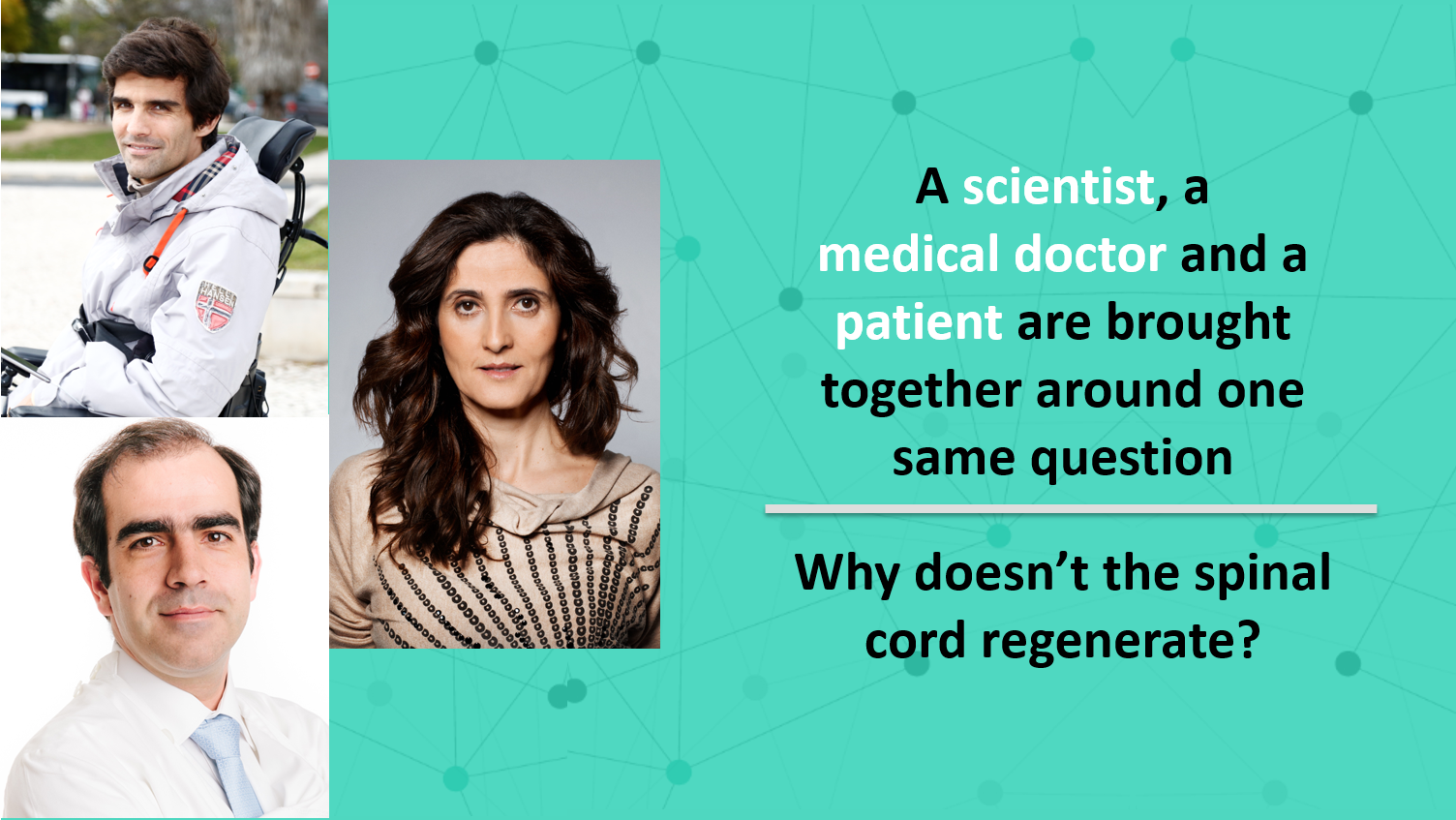
Horizontes iMM: Uma pergunta a três | Porto
A scientist, a medical doctor and a patient are brought together around one same question. This is the motto for the new cycle of public talks that will be based on four discoveries made by iMM scientists. These discoveries may strongly impact the future of human health and we want the society to know it and discuss them. This cycle of talks is an initiative of Instituto de Medicina Molecular João Lobo Antunes (iMM) in partnership with the Belmiro de Azevedo Foundation. The sessions will take place in the auditorium of Colégio Efanor (Pólo II), Matosinhos.
Know more about Horizontes iMM: Uma pergunta a três.
Why does cancer escape us?
January 8, 2020
Participants: Gabriela Fonseca, Luís Costa and Bruno Silva-Santos
Moderated by: Filipe Pinto
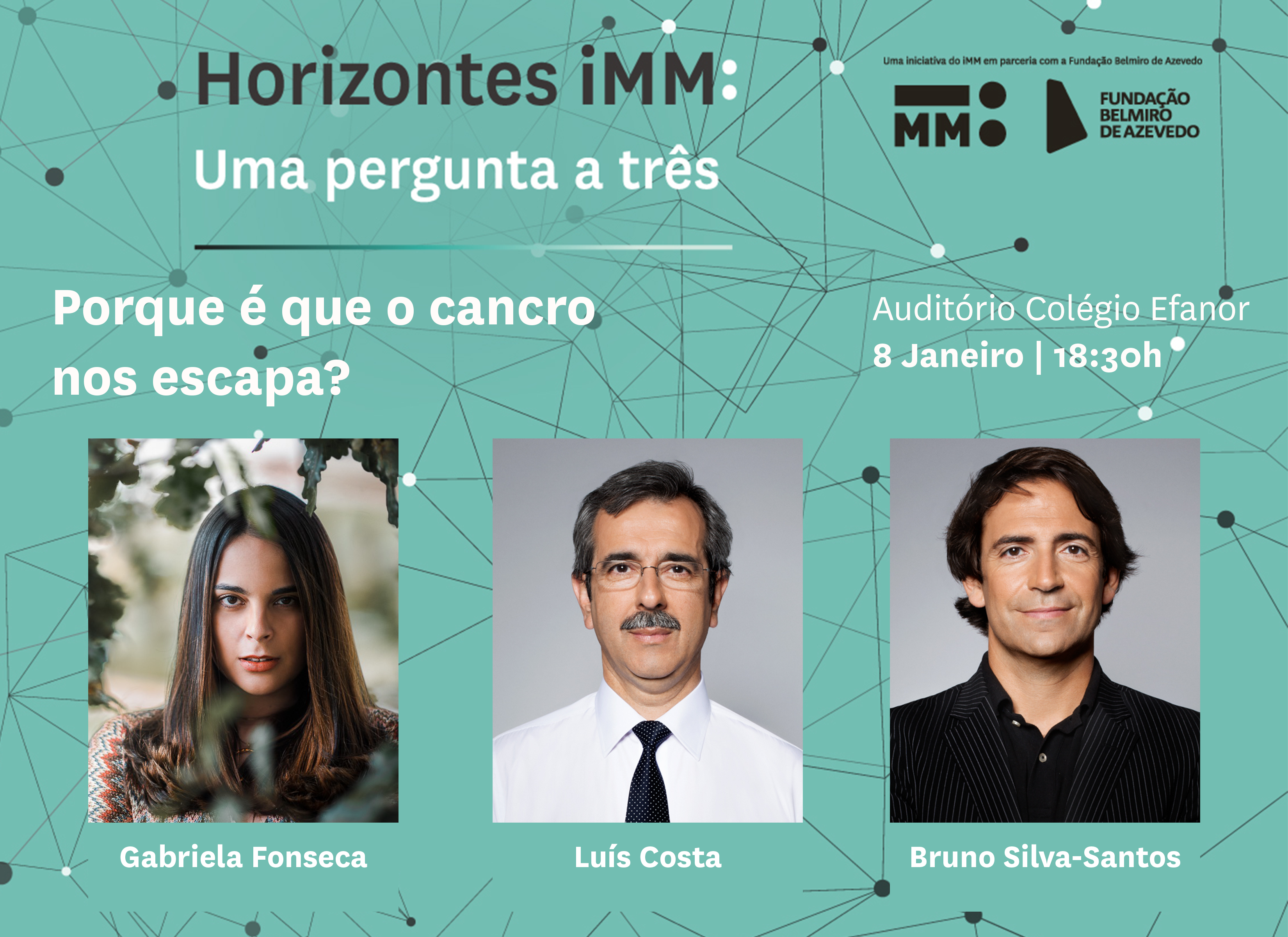
Why does the brain stop communicating with the body?
February 19, 2020
Participants: Paulo Teixeira Pinto, Joaquim Ferreira and Vanessa Morais
Moderated by: Pedro Pinto
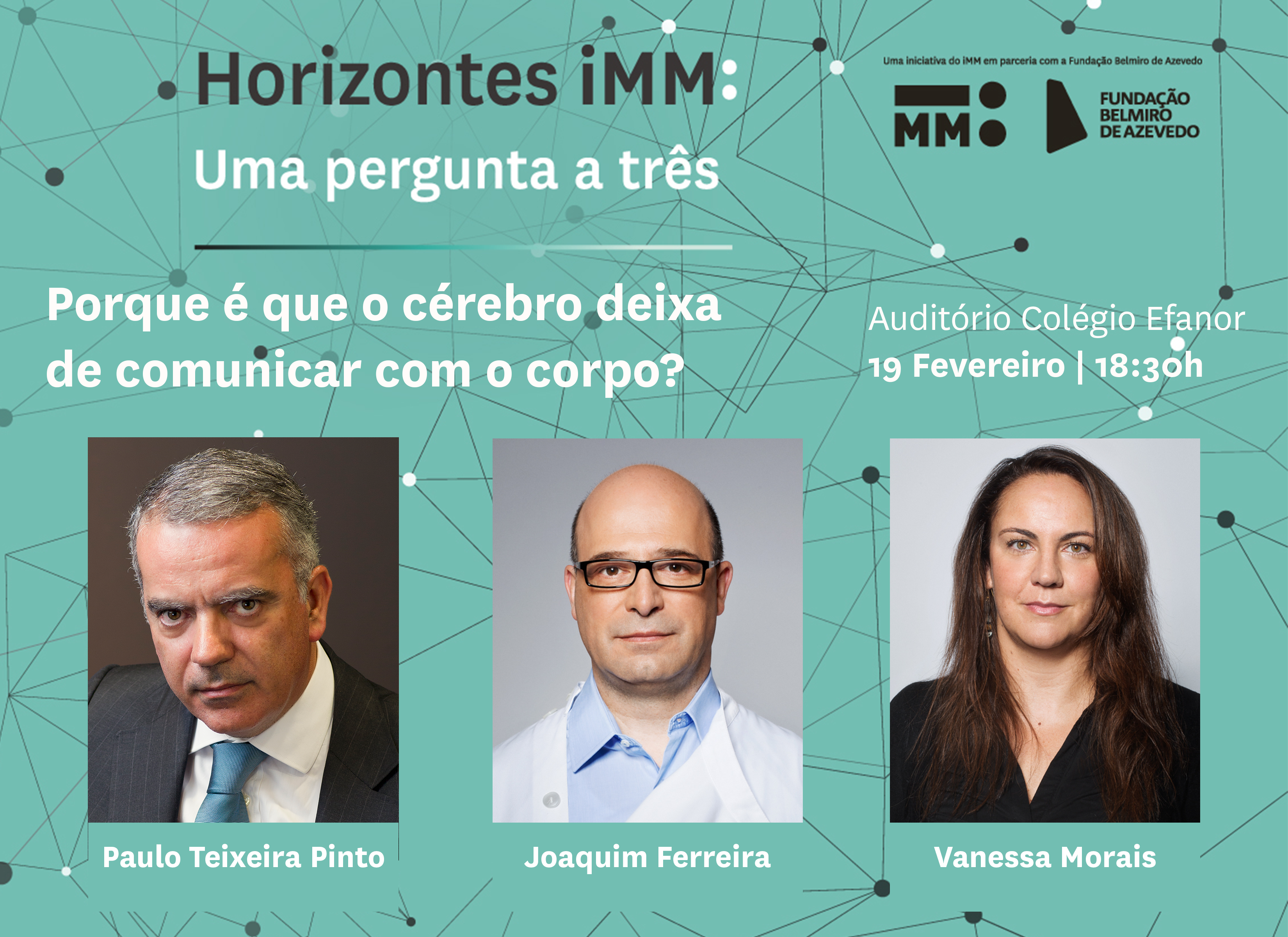
Why do muscles fail to obey?
March 20, 2019
Participants: Pedro Souto, Mamede de Carvalho and Edgar Gomes
Moderated by: Filipe Pinto

Science in the Streets
In 2018, it was developed a major public awareness campaign with the motto “There is no great question without a great answer”, that focused on the continuous chasing of questions that scientists at iMM pursue. This campaign targeting the general public was divided in several actions disseminated in newspapers, national television, social media, and locally in the Lisbon area as a mean to create a proximity to the local, national and international community.
“Why is there still no vaccine against malaria?”, “How does breast cancer appear?”, “What does chocolate do to our brains?” were some of the questions included in the graphical artworks produced to illustrate the research outputs of the scientists and the ongoing international projects at iMM. The artworks were disseminated through the 49 digital advertising billboards present in the streets and metro stations of the city of Lisbon. During four weeks, the citizens and visitors of Lisbon were able to visualize and interact with these signs. Simultaneously, the videos and graphical outputs were disseminated through the institutional social media channels.
“Unleashing curiosity about the images of science and the questions we are working on were the starting point for bringing scientists closer to the common citizen. Each outdoor had a specific QR Code linking scientific images to short videos with our scientists”, explains Maria M. Mota, Executive Director at iMM. Together with this, a multimedia spot hired on prime time of two Portuguese national TV channels reaching.
This campaign was also highlighted in the Portuguese media, including the magazines Briefing, Meios e Publicidade, the TV news programs Edição da Manhã SIC, Diário da Manhã TVI, and a radio show Prova Oral Antena 3, increasing the reach and impact of these actions.
Also, a Societal box was created. This box includes some of the graphical materials used for the campaign and has been distributed to representatives of different stakeholders (patients associations, industry, teachers and students, civil organizations, politicians). This combined approach optimised the resources available and increased the global benefits of the campaign, creating tools that promote the visibility of the research done at iMM.
It was the first time that a campaign of this kind was launched in Portugal, impacting the perception of the public on the work of scientists.
